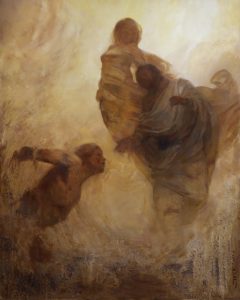Gospel Doctrine Lesson #3; Moses 1:27–42, Moses 2:1–25; 3:1–14, Moses 2:26–31; 3:7, 15–25.
The accounts of the Creation in Moses and Genesis are devoid of woman’s role in this series of events outside of the creation of Eve. Yet, LDS theology tells us that we have a Heavenly Mother and that She was involved in the Creation, that She is “a procreator and parent, a divine person, a co-creator, a co-framer of the plan of salvation, and is involved in this life and the next”[1]. We are taught that “all men and women are in the similitude of the universal Father and Mother, and are literally the sons and daughters of Deity”[2] and that we are created in Their image.
So much of the discussion about and surrounding Heavenly Mother, the little that exists, focuses so much on her relationship with and to Heavenly Father and about Her motherhood. These discussions resonate with many women I know. They see themselves in this depiction of a female God. But as one who is not a wife and not a mother, I personally find very little of it resonates with my life in the present. As the likelihood of marriage and childbearing grow less likely, I’ve turned more inward to discover what divine womanhood is for me. How do I manifest the feminine divine? And other questions: How do I absolve myself of shame for my female body—a body that mirrors a female God? How do I make sense of my present circumstances in relationship to eternity? How do I see the divine within myself? How am I now a co-creator with Them?
In searching for answers, I have felt drawn to start by focusing solely on my breath—to begin with the very thing that gives life, to begin at the beginning.
I think about my breath when I was a competitive swimmer. I worked a lot on breath control, on building lung capacity, on seeing how far I could swim without breathing. Lungs burning, that first breath always felt expansive, filling, truly life-giving. I remember that I can control my breath.
I think about my breath as I hike up mountains. I’m attuned to the rhythm of my breathing, as it increases with the incline and how my throat and lungs ache for oxygen the higher I climb. I rest, hoping to fill my lungs with just a little bit more air, and I appreciate that pause as a means to find quick respite. I remember that my breath allows me to accomplish hard tasks.
I think about my breath as a way to center and calm my anxious mind, how the tension and fluttering thoughts melt when I simply focus on breathing in and out, in and out. That cleansing breath has the power to make me feel new and whole—something so simple, yet so vital. I remember my breath provides healing and is a reminder to be still.
I think about my breath as it fills up my body, as I focus on sending energy down to my toes and out my fingers. I think about all of the things my body is able to do, how it’s not only a creation by itself, but how I am able to use it as an instrument to do and experience worthwhile things. I remember my breath means I have a body—a good one, too.
I think about my breath over the past several weeks, how it’s been more labored due to sickness, and how I’ve wished to breathe without feeling like I have a weight on my chest. I’ve said, “I just want to breathe!” which seems like a silly expression given I’ve been doing precisely that. I remember to not take my breath for granted.
I think about my breath in relation to others, how when I am in the midst of a close-knit group of friends, how our breath starts to sync. Or when I sit still at the base of trees, how I have heard what sounds like an audible sigh coming from their trunks and branches—or perhaps that was simply me, expressing appreciation at the shade they provide, and the reminder they give to look up. I remember I am connected to other living things through my breath. And I give thanks for that.
I think about my breath as God-given, as my spirit and soul, how with each breath I manifest a piece of Her, testifying of Her power and divinity. I think about how this power and divinity resides within me and how I impart my unique divinity beyond myself with each exhalation. I remember that my breath is a creation of the Divine, and that simply because I am a woman, my breath is a piece of the feminine divine.
I think about my breath metaphorically, how I am able to give the breath of life to seemingly lifeless ideas, how I feel dormant inside when I am in a creative slump or block, how breath and creation reminds me I am alive, that I have a part in this great, vast whole.
I remember. And for now, that is plenty.
[1] David L. Paulsen and Martin Pulido, “’A Mother There’: Historical Teachings about Mother in Heaven,” BYU Studies, 50:1, 85.
[2] LDS First Presidency, “The Origin of Man,” Improvement Era, Nov. 1909, 78.
Also, check out our podcast interview with Rachel Hunt Steenblick about her book of poetry, Mother’s Milk: Poems in Search of Heavenly Mother.
And our podcast interview Bethany Brady Spalding and McArthur Krishna about their new book, Our Heavenly Family, Our Earthly Families.

